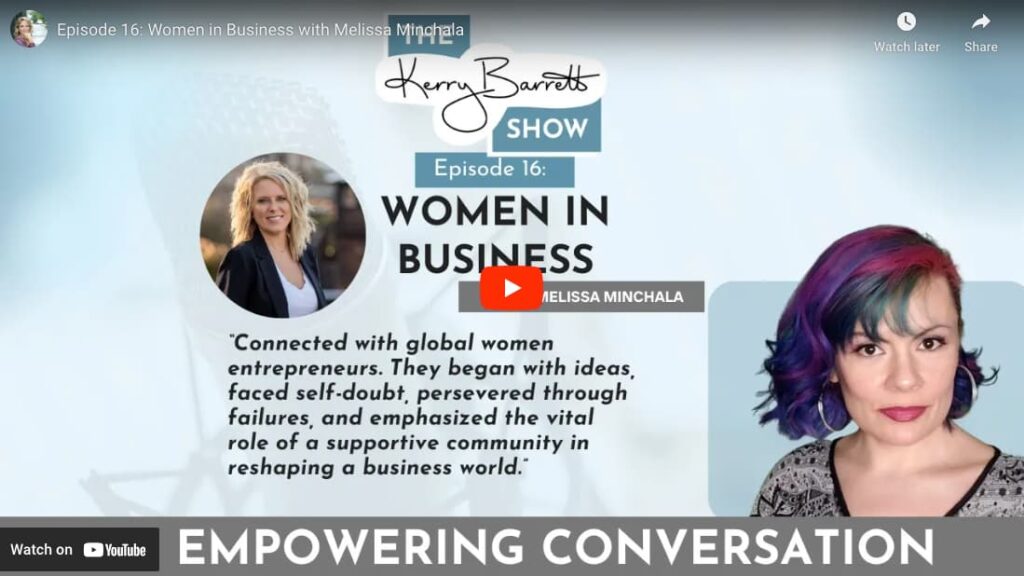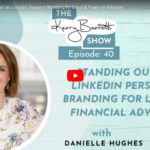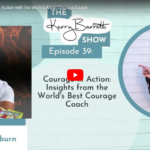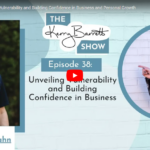
Melissa Minchala is a Certified Digital Strategist and has been a business owner for 25 years. Her mission is to equip service-based entrepreneurs with the foundational marketing elements that transcend platforms and tactics. From mastering key strategies to implementing high-converting techniques, she imparts the tools needed to establish a robust marketing foundation. She is also the host of the podcast, Divergent Women, a podcast that celebrates the stories and experiences of first-generation women entrepreneurs who dared to break the mold and start their own businesses, despite the odds stacked against them.
In this episode of The Kerry Barrett Show, host Kerry Barrett is joined by certified digital strategist Melissa Minchala. They discuss the challenges that women face in the male-focused entrepreneurial world and how they are overcoming them. They explore the position of women in the entrepreneurial world and the courage it takes to bet on oneself and take risks. Tune in to gain insights into the experiences and journeys of women entrepreneurs.
Transcript
Kerry: And thank you for watching and joining us here on the Kerry Barrett show. I’m Kerry Barrett your host, and we are joined today by Melissa Minchala. She is a certified digital strategist and somebody who I’ve grown to know and love over the course of my entrepreneurial years, Melissa, it’s so good to see you!
Melissa: Ah, it’s so good to be here. Thanks.
Kerry: You and I have talked quite a bit over, I guess, the last couple of years about the challenges that women have in this sort of male-focused entrepreneurial world. And it is a system that, as you say, is not really designed for us. We’re sort of, we eked our way in and now we’re kind of tolerated.
And often on the show, we talk about specific tactics and strategies as it pertains to visibility and awareness and digital marketing. We’ll have some time to talk about that, but I really wanted to take this opportunity to explore our position as women in this entrepreneurial world.
Melissa: I’ve spoken to many women about this. Cause I have, my own podcast, Divergent Women. And I’ve spoken to some amazing entrepreneurs who’ve come from all different walks of life, right? Some have started, their entrepreneurial journey, right out of college.
And many who have thought that they were going to do one thing. Studied, went to school, and then over time decided that they needed to do something else. And you know, the one thing that all of these women have is this indomitable courage, right? Because it takes a certain amount of courage to say, I’m going to bet on myself.
I’m going to take this risk because it is a risk. Every business owner is taking a risk. But as a businesswoman, we are taking a significantly bigger risk. Because, you know, and I’ve said this before, I’ll say it again, the business world that we come into is one that was not designed for us. It did not have us in mind and it barely tolerates us.
My entrepreneurial journey started in 1998. My background is in IT, right? So when I worked for somebody, I was, you know, refreshing servers. We were doing rollouts of new operating systems, I was putting in switches, that kind of stuff.
And when I decided I wanted to work for myself, I was, at the time, early two thousand, the only IT woman, right?
Kerry: Really? Like in your, wow!
Melissa: Yeah in my industry like there’s, an IT woman owner was, it was very rare and in New York City, you would think, you know, such a large city.
Yeah. I mean, I would find them in conferences that I would go to, but it was usually, that they were co-owners of their husband’s business. And they were like doing the books and there was husband the IT guy.
Kerry: sort working behind the scenes and husband was that… Yeah
Melissa: Right. So when I was trying to grow my business I would go and I would, you know, do you know, networking and I knew who my competitors were.
I would be approached with, oh, but you’re too pretty to be a geek. I can guarantee that my male competitors heard, well, you’re too handsome a geek.
You know, you’re too buff to be a geek, like none of that. And. You know, I was a mom I gave birth, raised four kids and I wanted to raise them the way I wanted to raise them.
I was an attachment parenting, you know, breastfed, I was with them all the time, but I also wanted to work. That is not the business culture, the culture that we have now, right? It is still either you’re a mom or you have a business. It’s almost impossible to do both, although I will say that talking to these women, is becoming more and more possible because these women are starting to see that they have to create these spaces for themselves.
Kerry: They almost have to create their own ecosystem.
Melissa: Absolutely.Absolutely.
Kerry: It is interesting. So to give a little bit of context, you and I have known each other via LinkedIn for quite a while and a couple of years ago, as of this recording, I had a breakdown on LinkedIn.
Where I was so frustrated and I was so scared and tired and exhausted. And we reconnected that way or connected and maybe in a deeper way is the way to phrase it.
And I think that most of the people who connected after that sort of public breakdown were women and they connected in a way that was supportive and there was not a lot of pitching of services or anything like that. I want to paint with a broad brush. We have a different understanding of some of the challenges that, women specifically face, you know, for example, you mentioned that you’re too pretty to do this or whatever.
One of your big initiatives has been to start your podcast and to create this community for women who are entrepreneurs and do have this desire to not just be pigeonholed as a mom or a wife or sort of a behind-the-scenes person, but somebody who was at the forefront of the business and driving development and revenue and innovation, even beyond that. When you hear people talk about those elements, what are some of the themes that you hear underlined?
And what are some of the ways that they’re challenging that and overcoming it?
Melissa: What I hear a lot is they start to wake up to the fact that what has worked, has never worked got them. And so they go, okay, like got to, I’ve got to quit this and that’s why I called it divergent women.
Because they’re on this path is sort of normal societal path, which has been very male-dominated, very male-oriented.
I was born in the seventies and raised by boomers. Right. And I was raised with that. You know, oh, don’t cry. I’ll give you something to cry about. Emotional suppression. Right. And, you know, growing up, getting into the workforce, there was a way of how to be professional.
And it was very much stripped all your emotions out of it. And just, talk business. When LinkedIn first came out, the LinkedIn of when it started versus the LinkedIn of today are two very different LinkedIn as well. Because people are starting to be more vulnerable.
So I think a lot of the theme and the women that I talked to, they tell me that they just realized that all of that, whatever those challenges that they were kind of working against just was not working for them. And they had to be more true to themselves. The landscape now is still this kind of male energy-driven.
What we’ve termed bro marketing right? It’s this sell sell sell, how do you hard sell, manipulate this and that. And some of the women I’ve spoken to have tried that have paid thousands of dollars, tens of thousands of dollars to coaches and have just walked away from it.
Because it felt so inauthentic to them. The really overarching theme is true authenticity. Because even when, and this is another thing that, we’ve talked about. Even when we see women who do thrive, whether in a professional or in an entrepreneurial sense, going in that sort of like male energy sell, or climb the ladder and, you know, step on whoever you need to get there.
There are women who thrive in it, but if you watch them, you can see that they are playing by somebody else’s rules. And that they’re only playing because they’re being allowed to. And the difference is that when you as a woman say this is not the way I want to play this game. This is not what I want to do.
I want to be freely more empathetic. I want to be more vulnerable. I want to be more authentic to who I am. It’s the embracing of that authenticity that really is sort of driving this forward.
Kerry: I love what you mentioned. So I’m going to backpedal for a second or backtrack is the right word. You mentioned you were raised by boomers with this, you know, sort of certain messaging, and that went around it. And I remember my dad also, I was born in the seventies, and raised by boomers as well.
And my father used to have a saying, my father was in a corporate environment. My mother was staying home. He used to always say the success for women in the workforce these days is to look like a woman, act like a man, and work like a dog. And the sort of underlying message there was you need to be feminine but don’t act that way.
Don’t act like a quote-unquote woman, because that’s unappealing. We need you to act like a man. You need to be, you know, in whatever sort of context you paint that with. And then you also need to work your tail off in order to make whatever is happening around you.
Now the misogyny is not, quite as overt. It’s a little more covert. Which I think can make it even more challenging to get around because it’s not obvious in our faces anymore. So what are some of the tactics and strategies that in this community you advocate for and that you hear other people deploying so that they can achieve the same sort of success while being authentic to their own selves as well?
Melissa: I think one of my saving graces is my age, right? So I am going to 49 in a couple of weeks and I’ve hit that age where I have far fewer Fs to give. Right?
I’m almost at none. And it can be difficult, but I also see that this, the newer generations, the younger generations are really embracing more of this of, I don’t care.
And our generation, because it was so male-dominated, there weren’t as many women in the workforce as we have now, as a matter of fact, there are more women coming out with college degrees than men. So we have made these strides that we didn’t have before. So when we were coming up.
We didn’t have that then that we have now. Social media also tends to level the playing field. We have so much more exposure now. So much more representation now. Many of the social influencers the successful ones are female. And that is through when you’re thinking about well, how do I sort of you know, navigate all this.
Because now it’s been, you have to work like you don’t have kids and raise your kids like you don’t have a job.
How do you do those two? What you have to do is you have to find the balance that works for you and screw everyone else. So if that means that, you know, oh, well, what are people going to think if my kids are watching too much, you know, screen time, what works for you?
In the end, if you are raising your kids in a way that is comfortable for you and that you are going to meet your goals for them, it’s fine. You know raise good productive citizens, do the job the way you want to do it. And do it well.
We talk about parents my father has told his kids and this is a boomer. An immigrant boomer. He said life is not about being happy.
And when he said that to me, I immediately felt devastated for him. Because I knew that, he didn’t like his job, but he was doing it because he had to. That’s not the way want to live my life. And don’t think anybody should live like that.
Kerry: Do you think he was buying into the idea that… You always hear if you love what you do, you don’t work a day in your life. I don’t necessarily believe that, because there’s always going to be components or days that are crappy. But do you think he bought into that idea that this, I’m living to work, rather than working to live?
Melissa: I know he did. He told me that shortly, right before telling me about how he had wanted to be an astrophysicist, but he didn’t know that astrophysicists could support a family. He didn’t think, how was I going to be an astrophysicist and support my family? My mother was a teacher, so she was pulling an income.
It was a two-income household, but he said, your mother would leave me if I wasn’t, you know, bringing in food to the house. Which I know was false, but that was what he had in his head. Like I’m not working to make me happy. I’m working to put food on the table
Kerry: It’s a different mindset entirely.
Melissa: Very different mindset
Kerry: You mentioned that the challenge may be specifically to immigrants. People who are first generation or even second generation, or maybe either the first to go to college or the first to start a business. Can you dive into that a little bit for us? Like, what are the specific challenges, especially for women who are in that position?
Melissa: Well, you know and it varies around the world, but it’s also the same around the world. So I’ve spoken to you know women who are from other countries who are very specifically told, you’re a girl you’re gonna be either a teacher or a mum. And that’s it. To go against those kinds of expectations, and societal expectations is very difficult.
You know, one woman that I spoke to, said that a friend of her mother came and she said, oh, what are you going to school for? She was when she was in college. She says, oh, I’m studying to be a teacher. And the lady said, oh, that’s fantastic. You know, my daughter wants to be an engineer and she’s giving me such a big headache over this.
So women all over the world are having to fight all these barriers put around them. And, you know, to the women that I’ve spoken to here in the United States who were raised in, you know, Middle America, they were also sort of raised with stability. That was the big one. You know, especially when you’re coming from a family, nobody in my family was an entrepreneur.
As a matter of fact, my father, I used to hear him several times. Oh, I would never own my own business. And I know that his parents had lost a lot of money, you know, through businesses. And so to him, that was traumatic. So I can understand where it came from. So when I was, you know, sort of opening my business and what I found that I didn’t have a lot to talk about with, I couldn’t talk about my colleague.
I couldn’t talk about, you know, the promotion. Because those were not, there was nothing for them to contribute with. Other women that I’ve spoken to, their parents would kind of like white knuckle it for them. Or would tell them, maybe you should just get a job, which is the last thing an entrepreneur is going to want to hear.
And the truth is as an entrepreneur, going to have ups, you’re going to have downs. You’re never going to have a flat steady the way a paycheck does. But in all even these days, even a flat paycheck doesn’t stay away because you can be laid off at anybody’s whim.
So that’s really some of the biggest obstacles. And so what do these women do when they hear, you know, oh, maybe you should just get a job or, you know, the mom that says, I don’t know why you’re doing. Are you sure this is the right thing for you? They have to buck up and keep on going and remember why they’re doing it. It takes a lot of fortitude. It really takes a lot of fortitude.
Kerry: Has there been anything that’s been surprising to you within the community? And obviously, you have a lot of experience. You worked for someone, you have your own business. So my point is you have a lot of experience in these different areas or perspectives. Has there been anything that’s been surprising to you that women have said to you in either your podcast, Divergent Women, or within your community that you see as a new challenge for younger entrepreneurs or something that was unexpected that we need to, you know, put more to?
Melissa: You know, I have to give a lot of credit to the younger entrepreneurs and they think that they have a lot of advantages given by the internet. Because they have a very distinct ability to identify where their own problems are, their inner problems. So there’s this a lot of, there’s this movement of, you know, healing trauma or ending generational trauma.
And that’s an amazing quality because, you know, the first step to really fixing anything is to acknowledge its existence. And they just fly right through. Meanwhile, our generation, certainly the generation before us, may be a little bit, our generation. I think we were, the Oprah generation, right?
Because we had Oprah Winfrey who was talking about everything and anything. And we were right there with the conversation. She opened up a lot of conversations for us. And now the internet just broke that seal. And now everybody’s talking about everything. But when the past generations, like the boomer generations, no one talked about anything, and just cycles repeated and things got worse. This newer generation, the younger generations, they’re all about, let’s find where the problems are, resolve them, and move on forward. So I cannot really think of any obstacles that they because they’re so good at just preemptively facing them.
Kerry: I think one of the interesting things is, you know, you sort of mentioned generational trauma or child trauma and how that sort of infuses every part of our lives. And we’re much more open to discussing it and moving past part of it because of Oprah. Part of just because of the, you know, the way that we evolve in advance. You know, generations ago, two or three generations ago, women certainly experience the same kind of head trash that I know I experience on a daily basis or imposter syndrome that I experience on a daily basis. We were more likely to attribute that, I think, at least, you know, internally as to our own perceived lack.
You know, wherever we lacked, we have this, you know, I have imposter syndrome because I really am bad at this particular thing, or I have this head trash going on because I really don’t have what it takes to do this or that.
Now we recognize that those aren’t necessarily, truths with stories that we’ve made up inside of ourselves because of conditioning or messaging or past experiences or whatever it is.
And I think that’s one of the greatest things about community. This sort of community-building idea is something that I have not, I’ve only been in business for four years. But I’ve seen it grow and grow even over the course of the last couple of years. And it is very predominantly female-driven. Which I think is super cool because we are sort of continuing the work that the generations before us have as well. So tell me a little bit about your community, like what inspired it? And how are you using it to help female entrepreneurs take the next steps or move to the next step? To move to the next level?
Melissa: One of the biggest reasons that I started the podcast and wanted to grow that community is because I am a first-generation entrepreneur. And It can be difficult. And just owning a business is isolating. You know, work for someone for good and bad days, you can talk to your colleague about how much you hate or how much you hate your boss or how much you hate…
But you it’s just you, then the conversation is about how much you hate you. And I knew this was going on and I know, and I was watching so many new entrepreneurs get in. And I that no one tells you this. Like there’s no welcome packet super lonely hey, welcome to the club. By the way, you’re going to be super lonely and you’re going to hate it. You’re going to hate a lot of it, but okay. Keep on going.
You’re awesome. It’s going to be great. And I wanted that honesty, and I wanted other people to see themselves in these stories. I wanted other people to be able to hear these women talk about the obstacles that they had to go through. And like I said before, I’ve spoken to women who are from around the world.
Many of the stories are different, but they are all the same. In that, they started out with this great idea. They had some doubts, but they really wanted to do it. And they had the fortitude to keep going and they’ve had their failures.
And even though they may not be where they want to be, they’re working towards getting there. And they wouldn’t do it any other way. And they keep on going. And that’s the thing. That’s the experience that we all have. But we cannot have it alone or we should not have it alone. We should have it as a community. You know, sort of like pulling people with us, because like we said before this business community that we came into was not meant for us. It’s time for us to start to create our own. And we can absolutely do that.
Kerry: Do you think there’s a crossover or overlap between female entrepreneurs and women who are also working in corporate or in perhaps even male-dominated industries? Are there similar challenges?
Melissa: I think it depends on the woman. Every woman has their own ambition. Right. And I gotta say everybody is different. So my home is not very well decorated cause that’s just have thing. So I don’t have a great art piece. I have knickknacks and paddywhacks. I don’t have art pieces, right? My best friend, she makes a beautiful home. And there are women who are ambitious in the workforce, right? Instead of in the home.
So it depends. So if a woman who’s in the workforce, but really her ambitions are somewhere else, they not going to have the same sort of challenges as someone who is ambitious in, you know, in entrepreneurial. Because if you’re ambitious in the workforce, you’re going to come up against a lot more obstacles, and if you’re ambitious in the home. Because you just have fewer people that you’re coming against. So it depends on the person. It depends on the position that they’re in.
Kerry: I also think that is very smart because often men and women were painted with a very broad brush. You’re either this or you’re that. It’s sort of that if I’m being very down to basics, it’s almost like Madonna’s horror complex. You know, you’re either one thing or you’re the other. It’s very binary.
And as women, we know that doesn’t apply. And I think we’re beginning to realize as men or for men, that doesn’t really apply either. And there’s an opportunity for us to bring our full selves to both places, which has only been amplified since the pandemic. And now everybody’s seeing our, you know, sunrooms and our kitchens and everything.
Melissa: You see nothing because I’ve got nothing to show.
Kerry: If you look just slightly off-screen, you’ll see there’s a full-fledged disaster brewing. If you’re listening to this, go check it out on YouTube. Melissa, I could talk to you forever. And I do have to say you have been one of the constants in my entrepreneurial journey. And I had zero business experience when I you know, sort of launched into this world without a lot of thought.
And you have been such a support and so amazing. And I know that the community that you’re creating will be a huge source of support and inspiration for other women who are going through the same thing. So tell us a little bit about, you know, where people can learn more about the community, we haven’t talked a lot about your digital marketing agency, but if they are interested in working with you, where should they go to get more information? What would you like that to be?
Melissa: So I’ve got a Facebook group. It’s driven by female entrepreneurs. It’s very simple if you’re a driven female entrepreneur. And the other thing also, I just want to sneak in there because it came to mind, but we also have to remember that every woman doesn’t have one season of life, right?
You can be many things throughout your life. So even if you’ve decided after 30 years of being in the workforce, you want to be an entrepreneur, you can do it. I encourage you to do it. So driven female entrepreneurs is my Facebook group. Come and join us there. My podcasts, which I highly recommend because of the women there, the stories are just phenomenal divergent women.
You could find it. And just every podcast platform. You can find out how to work with me on melissaminchala.com. And Kerry, you have been a delightful addition to my life.
Kerry: Oh, he’s so sweet. Go on. It was great talking to you, Melissa. Thank you so much for being part of this. Thank you.




